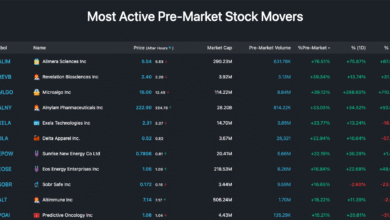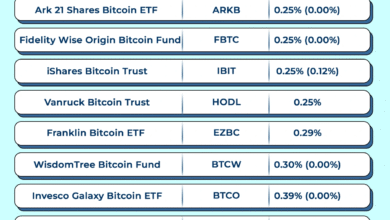Bitcoin Recovery Surges as Oil Prices Ease Further

Bitcoin recovery is gaining momentum as the cryptocurrency market reacts favorably to easing oil prices. Following a tumultuous period influenced by geopolitical tensions, particularly the conflict between Israel and Iran, Bitcoin appears to have regained its footing. As oil prices have now dipped below pre-war levels, fears of a global supply disruption have subsided, signaling a more stable environment for cryptocurrencies. This calm has led to a significant Bitcoin price surge, with the digital currency climbing above $105,000 recently. Investors are closely monitoring how the resumption of the Iran oil trade may further impact the markets, particularly as the demand dynamics shift amid changes in global oil supply.
The resurgence of Bitcoin, often seen as a bellwether in the cryptocurrency domain, can be attributed to a multitude of factors including the recent stabilization of oil prices. With the geopolitical landscape calming down after the Iran conflict, alternative investments like digital currencies are once again attracting attention. This recovery not only marks a pivotal moment for Bitcoin but also reflects the intrinsic connection between energy commodities and cryptocurrency valuations. As lower oil prices alleviate market fears, they are paving the way for a more robust cryptocurrency environment. Analysts are keenly observing these developments, as they could potentially shape trading strategies going forward.
The Impact of Oil Prices on Bitcoin Recovery
In recent weeks, the cryptocurrency market has experienced a significant shift as Bitcoin recovers amidst a backdrop of declining oil prices. The easing of oil prices has been attributed to geopolitical factors, particularly the easing of tensions between Iran and Israel. As oil prices dropped, gaining more stability, Bitcoin’s market behavior mirrored this trend. This correlation can largely be traced back to the interconnectedness of global economic factors, where fluctuations in commodity prices often influence investor sentiment towards cryptocurrencies.
The current scenario demonstrates how Bitcoin’s price recovery is not occurring in isolation. With oil prices now reflecting pre-conflict levels, the fears of a global supply disruption have diminished. This environment enables investors to shift their focus from traditional commodities to digital assets like Bitcoin. As the oil market stabilizes, more investors are willing to venture back into Bitcoin, viewing it as an asset not directly tied to the underlying supply issues of traditional energy commodities.
Bitcoin Price Surge Linked to Eased Tensions in Iran
The latest surge in Bitcoin’s price can be linked to the announcement by U.S. President Donald Trump, which allowed China to continue its oil purchases from Iran. This decision has alleviated fears surrounding potential sanctions and disruptions in the oil supply chain. As the world’s second-largest economy continues to secure its energy needs from Iran, the global oil market’s stabilization has, in turn, reinvigorated confidence in the cryptocurrency market, particularly Bitcoin.
Additionally, the increase in Bitcoin’s price to over $105K showcases how cryptocurrency can react positively to developments in the oil sector. As the oil situation persists without major disruptions, and with improved trade for oil countries like Iran, Bitcoin’s value retains its bullish momentum. Investors are recognizing that stable global oil prices are conducive to risk-taking in digital assets, thereby amplifying Bitcoin’s recovery.
Analyzing the Cryptocurrency Market Dynamics
The cryptocurrency market’s dynamics are profoundly influenced by current global events, particularly in the oil sector. The recent uptick in Bitcoin’s trading volume reflects heightened activity amidst the easing concerns surrounding global oil supply disruptions. With Bitcoin now trading at approximately $105,755.74, it shows a remarkable resilience and recovery, inviting both institutional and individual investors back to the market.
Such a surge is indicative of the changing landscape within the cryptocurrency market. As oil prices stabilize, investors are more inclined to consider Bitcoin as a hedge against inflation and economic instability. The fluctuating conditions in traditional markets often push traders towards digital currencies, and with the crypto market capitalization approaching $2.10 trillion, it’s clear that Bitcoin’s positioning is becoming increasingly favorable.
The Role of Iran in Global Oil Supply and Its Effects on Bitcoin
Iran traditionally has played a significant role in the global oil supply, being one of the top producers in the world. With reserves amounting to substantial daily output, any disruption in their oil production tends to create ripples across various financial markets, including cryptocurrencies. The recent military tensions coupled with the easing of hostilities have permitted Iran to maintain its oil production levels, which is a positive sign for both oil traders and cryptocurrency investors.
As Iran continues to engage in oil trade, the resultant stability is a boon for Bitcoin. The correlation observed between Bitcoin’s rising price and stable oil markets suggests that while cryptocurrencies may act autonomously, they often respond to broader financial systems. The current trend shows that as long as Iran can trade oil without significant interruptions, Bitcoin’s recovery will likely continue, as investor confidence in commodities remains intertwined.
Market Metrics That Matter for Bitcoin Investors
Understanding key market metrics is essential for Bitcoin investors aiming to navigate through volatile periods. The recent increase in Bitcoin’s trading volume by 12.92% indicates an upsurge in market engagement, highlighting a healthy level of investor activity. Additionally, monitoring Bitcoin’s daily price fluctuations provides insight into market sentiment and the potential for continued recovery amidst shifting oil prices.
Moreover, the observed spike in open interest for bitcoin derivatives signals that traders are positioning themselves for potential price movements. As liquidations of short positions reached over $102 million, it reflects a tactical shift in sentiment, with bullish players taking advantage of the current market situation. Investors must stay attuned to these metrics, as they often serve as indicators of probable market trends moving forward.
Long-term Implications of Oil Price Trends on Bitcoin
The long-term implications of fluctuating oil prices on Bitcoin and the broader cryptocurrency ecosystem cannot be understated. As traditional markets and commodities directly impact investor behavior, consistent monitoring of oil price dynamics can provide valuable insights into Bitcoin’s trajectory. If oil prices remain stable, this bodes well for Bitcoin’s continuous recovery and growth, as more investors may be inclined to diversify their portfolios with cryptocurrencies.
Furthermore, as the intersection between the oil market and cryptocurrency becomes more pronounced, Bitcoin could potentially emerge as a new asset class akin to oil in terms of being a store of value. The shift towards decentralized digital assets may attract traditional commodities investors as the benefits of Bitcoin’s volatility in contrast to oil’s steadiness are seen as attractive for potential gains in the long run.
Identifying Stable Investment Opportunities Amidst Market Volatility
In the ever-changing landscape of the cryptocurrency market, identifying stable investment opportunities is crucial for long-term success. With Bitcoin currently on the rise, driven by a positive correlation with easing oil prices, savvy investors are starting to see this as an opportune moment to enter or increase their positions. The stability provided by the oil market could serve as a launching pad for further growth in Bitcoin and related assets.
Adopting a risk-managed approach to investing in Bitcoin, amid the fluctuating oil prices, allows investors to strategically allocate resources. Focusing on balancing portfolios with both traditional and digital assets can lead to more secure long-term financial outcomes, particularly as Bitcoin asserts itself as a potential hedge against inflation caused by volatility in other markets.
Geopolitical Events Shaping the Future of Bitcoin
Geopolitical events have a profound impact on financial markets, and the current situation between Israel and Iran serves as a case in point. The resolution of these tensions has not only had a positive effect on oil prices but has also created a favorable environment for Bitcoin to recover. As conditions normalize, it opens new pathways for investment and speculation in the cryptocurrency market.
Moreover, the ripple effects of geopolitical events extend beyond immediate market reactions. As Bitcoin continues to rise amidst easing oil prices, the attention of global investors will likely shift towards understanding how similar future events may influence the cryptocurrency realm. This heightened awareness could lead to increased analysis and strategic positioning by investors aiming to capitalize on Bitcoin’s potential in a world where traditional commodity markets remain susceptible to political fluctuations.
Future Outlook: Bitcoin and Oil Market Interrelation
The future outlook of Bitcoin’s journey will heavily rely on its interrelation with the oil market. As cleaner energy alternatives evolve and oil prices also adapt amid changing global policies, Bitcoin may find itself at a critical intersection where its role as a digital commodity could either enhance or diminish. Investors must keep an eye on these evolving dynamics as they could play a significant role in determining Bitcoin’s long-term viability.
In conclusion, the relationship between Bitcoin and oil prices paints a compelling narrative for investors. If oil prices stabilize, the potential for Bitcoin to maintain its recovery and upward trajectory appears promising. Understanding the core economic principles that govern this interplay can lead to more informed investment decisions and a stronger grasp of market mechanics in the cryptocurrency arena.
Frequently Asked Questions
How does Bitcoin recovery correlate with fluctuations in oil prices?
Bitcoin recovery is often influenced by fluctuations in oil prices due to the interconnectedness of global markets. When oil prices ease, as seen in recent events following U.S. and Iran tensions, Bitcoin has shown a tendency to recover and grow in value. This correlation may reflect investor sentiment and risk appetite, as lower oil prices can lead to a more stable economic outlook.
What recent events have contributed to the Bitcoin price surge during oil price declines?
The recent easing of oil prices, particularly after geopolitical tensions between Israel and Iran, has contributed significantly to the Bitcoin price surge. When fears of an oil supply disruption subsided, Bitcoin experienced recovery as investors felt more optimistic about market stability, leading to increased demand and trading activity in the cryptocurrency market.
Is Bitcoin recovery sustainable in light of global oil supply issues?
Bitcoin recovery may be sustainable if global oil supply issues remain stable. The recent decline in oil prices, following the resolution of tensions between Iran and Israel, has provided a favorable environment for Bitcoin to rebound. However, ongoing monitoring of oil market dynamics is essential, as any resurgence in supply concerns could impact Bitcoin prices.
How are Bitcoin recovery trends impacted by the cryptocurrency market’s relationship with oil prices?
The cryptocurrency market, including Bitcoin recovery trends, is often sensitive to oil price movements. Lower oil prices can signal reduced economic uncertainty, thus bolstering investor confidence in cryptocurrencies. This positive sentiment can lead to increased buying pressure on Bitcoin, contributing to its price recovery.
What role do geopolitical events play in Bitcoin recovery amid changing oil prices?
Geopolitical events play a crucial role in Bitcoin recovery, particularly with their effects on oil prices. Events that disrupt oil supply or create uncertainty in the oil market can lead to volatility in Bitcoin prices. Conversely, when tensions ease, as seen recently, Bitcoin often experiences a recovery as traders regain confidence in the broader economic landscape.
| Key Point | Details |
|---|---|
| Oil Prices Decline | Oil prices dropped below pre-war levels, alleviating concerns of a global supply disruption. |
| Bitcoin Recovery | Bitcoin rose to over $105K as oil prices declined, gaining 3.24% in 24 hours. |
| U.S. Policy Changes | President Trump allowed China to continue purchasing oil from Iran, which soothed market fears. |
| Market Metrics | Daily trading volume for Bitcoin increased by 12.92%, reaching $61.40 billion, with market cap at $2.10 trillion. |
| Bitcoin Dominance | BTC dominance remained strong at 65.24%, despite a slight drop of 0.14%. |
Summary
Bitcoin recovery is being positively influenced by easing oil prices, which have significantly reduced market tensions. As investors regain confidence, Bitcoin has not only rebounded from recent lows but is also reflecting healthy trading metrics. The latest developments in international oil purchasing agreements further bolster expectations for sustained Bitcoin growth.




